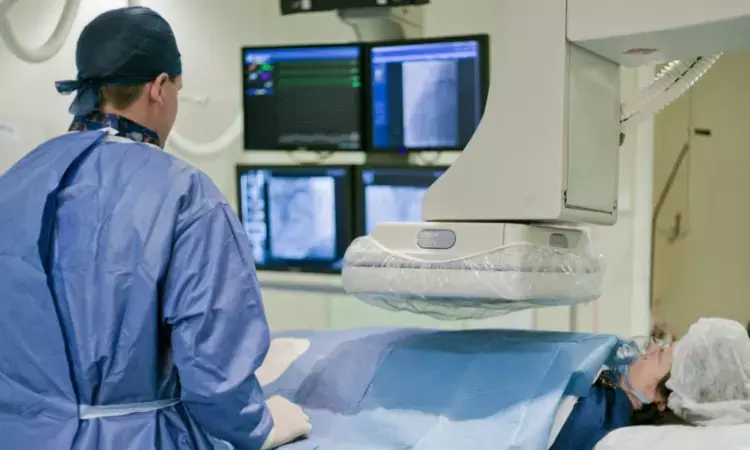- Home
- Medical news & Guidelines
- Anesthesiology
- Cardiology and CTVS
- Critical Care
- Dentistry
- Dermatology
- Diabetes and Endocrinology
- ENT
- Gastroenterology
- Medicine
- Nephrology
- Neurology
- Obstretics-Gynaecology
- Oncology
- Ophthalmology
- Orthopaedics
- Pediatrics-Neonatology
- Psychiatry
- Pulmonology
- Radiology
- Surgery
- Urology
- Laboratory Medicine
- Diet
- Nursing
- Paramedical
- Physiotherapy
- Health news
- Fact Check
- Bone Health Fact Check
- Brain Health Fact Check
- Cancer Related Fact Check
- Child Care Fact Check
- Dental and oral health fact check
- Diabetes and metabolic health fact check
- Diet and Nutrition Fact Check
- Eye and ENT Care Fact Check
- Fitness fact check
- Gut health fact check
- Heart health fact check
- Kidney health fact check
- Medical education fact check
- Men's health fact check
- Respiratory fact check
- Skin and hair care fact check
- Vaccine and Immunization fact check
- Women's health fact check
- AYUSH
- State News
- Andaman and Nicobar Islands
- Andhra Pradesh
- Arunachal Pradesh
- Assam
- Bihar
- Chandigarh
- Chattisgarh
- Dadra and Nagar Haveli
- Daman and Diu
- Delhi
- Goa
- Gujarat
- Haryana
- Himachal Pradesh
- Jammu & Kashmir
- Jharkhand
- Karnataka
- Kerala
- Ladakh
- Lakshadweep
- Madhya Pradesh
- Maharashtra
- Manipur
- Meghalaya
- Mizoram
- Nagaland
- Odisha
- Puducherry
- Punjab
- Rajasthan
- Sikkim
- Tamil Nadu
- Telangana
- Tripura
- Uttar Pradesh
- Uttrakhand
- West Bengal
- Medical Education
- Industry
Colchicine fails to prevent atrial arrhythmia recurrence after ablation for AF, finds trial

Canada: Colchicine administration for ten days following catheter ablation reduced post-ablation chest pain and increased diarrhoea, however, it failed to reduce atrial arrhythmia recurrence or atrial fibrillation (AF)-associated clinical events, a small pilot trial showed.
"Through 14-day Holter monitoring, colchicine failed to prevent the recurrence of atrial arrhythmia after ablation (31% versus 32% with placebo; HR 0.98) nor at three months (14% versus 15%; HR 0.95)," Alexander P. Benz, Population Health Research Institute at McMaster University in Hamilton, Ontario, and colleagues reported in the study published in Circulation: Arrhythmia and Electrophysiology.
During a median follow-up of 1.3 years, the anti-inflammatory drug also did not lower the composite of cardiovascular hospitalizations, emergency department visits, cardioversions, or repeat ablations (29 vs 25 per 100 patient-years; HR 1.18).
Inflammation may promote the recurrence of atrial fibrillation after catheter ablation. Colchicine is a widely prescribed anti-inflammatory agent that has cardiovascular prevention benefits. Therefore, Dr. Benz and colleagues aimed to evaluate a short-term anti-inflammatory treatment with colchicine following AF ablation.
For this purpose, the patients scheduled for ablation were randomized to receive twice daily colchicine 0.6 mg or placebo for 10 days. The study drug's first dose was administered within 4 hours before ablation.
Atrial arrhythmia recurrence was defined as atrial fibrillation, atrial flutter, or atrial tachycardia >30 s on two 14-day Holters performed immediately and at 3 months following ablation.
Based on the study, the researchers reported the following findings:
· The modified intention-to-treat population included 199 patients (median age, 61 years; 22% female; 70% first procedure) who underwent radiofrequency (79%) or cryoballoon ablation (21%) of AF.
· Antiarrhythmic drugs were prescribed at discharge in 75% of patients.
· Colchicine did not prevent atrial arrhythmia recurrence at 2 weeks (31% versus 32%; hazard ratio [HR]) or 3 months following ablation (14% versus 15%; HR, 0.95).
· Postablation chest pain consistent with pericarditis was reduced with colchicine (4% versus 15%; HR, 0.26) and colchicine increased diarrhoea (26% versus 7%; HR, 4.74).
· During a median follow-up of 1.3 years, colchicine did not reduce a composite of emergency department visits, cardioversion, cardiovascular hospitalization, or repeat ablation (29 versus 25 per 100 patient-years; HR, 1.18).
Limitations include small samples, recurrent arrhythmias were not looked at using implantable loop recorders that would likely result in an undercounting in both treatment groups.
"For patients undergoing catheter ablation for AF there was no signal that a brief course of colchicine reduced atrial arrhythmia recurrence or improved clinical outcomes when taken for 10 days starting right before the procedure," the researchers concluded.
Reference:
Benz AP, et al "Colchicine to prevent atrial fibrillation recurrence after catheter ablation: a randomized, placebo-controlled trial" Circ Arrhythm Electrophysiol 2023; DOI: 10.1161/CIRCEP.123.012387.
Dr Kamal Kant Kohli-MBBS, DTCD- a chest specialist with more than 30 years of practice and a flair for writing clinical articles, Dr Kamal Kant Kohli joined Medical Dialogues as a Chief Editor of Medical News. Besides writing articles, as an editor, he proofreads and verifies all the medical content published on Medical Dialogues including those coming from journals, studies,medical conferences,guidelines etc. Email: drkohli@medicaldialogues.in. Contact no. 011-43720751


